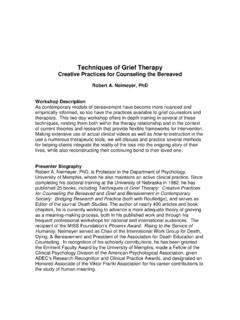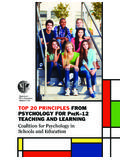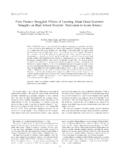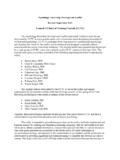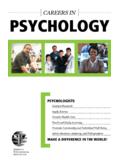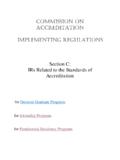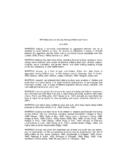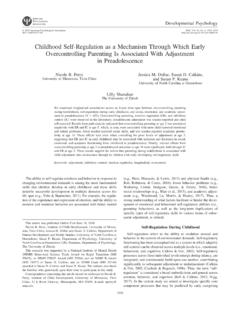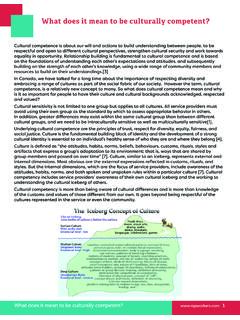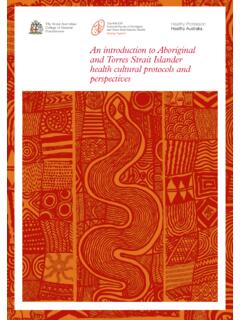Transcription of CULTURAL COMPETENCE AS A CORE EMPHASIS OF …
1 CULTURAL COMPETENCE AS A COREEMPHASIS OF PSYCHOANALYTICPSYCHOTHERAPYP ratyusha Tummala-Narra, PhDBoston CollegePsychoanalytic theory has been criticized for decontextualizing individual de-velopment. While recognizing the historical neglect of sociocultural context inpsychoanalytic theory, this article raises attention to psychoanalytic contribu-tions to the exploration of sociocultural issues in psychotherapy and calls for asystematic inclusion of CULTURAL COMPETENCE as a core area of EMPHASIS ofpsychoanalytic psychotherapy. The article includes a brief review of culturalcompetence in professional psychology, and both a critique of psychoanalysisregarding the neglect of sociocultural context in psychotherapy and a discussionof psychoanalytic contributions to a complex understanding of socioculturalissues in psychotherapy. Specific approaches to CULTURAL COMPETENCE that extendexisting psychoanalytic theory concerning sociocultural context are include the recognition of historical trauma and neglect of socioculturalissues, indigenous CULTURAL narratives, role of context in the use of language andexpression of affect, influence of experiences of social oppression and stereo-types on therapeutic process and outcome, and the dynamic nature of :psychoanalytic theory, psychoanalysis, psychotherapy, culturalcompetencePsychoanalytic theory has been criticized for neglecting issues of social context andidentity and for privileging internal life over external realities of clients in psychotherapy(Brown, 2010;Wachtel, 2009).
2 However, many psychoanalytic scholars over the twodecades in particular have examined various aspects of social context as it relates tointrapsychic and interpersonal processes (Akhtar, 2011;Altman, 2010; Leary, 2006). Thepresent article aims to extend psychoanalytic contributions to the understanding ofdiversity to a more systematic inclusion of CULTURAL COMPETENCE as a core, essentialcomponent of psychoanalytic psychotherapy. In the following sections, I discuss howThis article was published Online First May 5, concerning this article should be addressed to Pratyusha Tummala-Narra,PhD, Boston College, 319 Campion Hall, 140 Commonwealth Avenue, Chestnut Hill, MA document is copyrighted by the american psychological association or one of its allied article is intended solely for the personal use of the individual user and is not to be disseminated Psychology 2014 american psychological Association2015, Vol.
3 32, No. 2, 275 2920736-9735/15/$ COMPETENCE has been defined in professional psychology, a critique of psycho-analytic approaches to social context, recent psychoanalytic scholarship that addressesissues of social identity, and the ways in which psychoanalytic theory can both betransformed by and transform existing understandings of CULTURAL COMPETENCE in profes-sional COMPETENCE in Professional PsychologyMulticulturalism, identified as the fourth force in psychology (Pedersen, 1991), aims to encourage inclusion and enhances our ability to recognize ourselves in others (Comas-D az, 2011). The multicultural counseling movement in mental health paralleled the CivilRights movement of the 1950s and 1960s (Arredondo & Perez, 2003; Hurley & Gerstein,2013). Psychologists began to challenge the universal applications of psychotherapyapproaches rooted in Euro american CULTURAL values and norms. Further, the multiculturalmovement in psychology, along with feminist psychology, has challenged traditionalapproaches to psychotherapy for rarely addressing issues of power, privilege, and morebroadly social context.
4 From this view, Western-based psychotherapies, such as psycho-analytic, cognitive-behavioral, and humanistic therapies have historically decontextual-ized, ahistoricized, and depoliticized individual development. It is worth noting thatscholars such as Abram Kardiner and Georges Devereaux, using a psychoanalytic-anthropological framework, challenged the cross- CULTURAL application of psychoanalyticideas, and a number of psychoanalysts in the middle of the 20th century, such as EricFromm, Karen Horney, Harry Stack Sullivan, and Erik Erikson, argued that developmentis shaped by contextual issues that vary across cultures and time periods. In the 1970s,1980s, and 1990s, american psychiatrists and psychologists who took an anthropologicalperspective, such asKleinman (1995), focused on culturally distinct explanatory modelsof distress. However, asComas-D az (2011)has noted, psychiatric and psychologicalanthropology, and the CULTURAL school of psychoanalysis did not develop specific methodsto translate the theoretical understandings of culture and context to clinical psychology, on the other hand, involved a turn toward new models thatwould explain minority and majority group identities as rooted in the context of particularsocial (gendered and racialized) interactions.
5 The new frameworks that emerged recog-nized that psychotherapy, which decontextualized, apoliticized, and ahistoricized devel-opment may actually contribute to internalized oppression and a compromised sense ofagency (Atkinson, Morton, & Sue, 1998; Comas-D az, 2011; Helms, Nicolas, & Green,2010). TheAmerican Psychiatric association (1994)published the CULTURAL formulationand culture-bound syndromes, in response to the increasing awareness of the role ofculture in diagnosis. The american psychological association developed guidelines forproviders of services to ethnic, linguistic, and culturally diverse clients, and it was notuntil 2003 that it approved its Guidelines on Multicultural Education, Training, Research,Practice, and Organizational Change ( american psychological association , 2003). Theseguidelines support the place of context in a client s life and call for culturally competentpractice, including using culturally appropriate assessment tools and psychological tests,the inclusion of a broad range of psychological interventions, and the inclusion ofculture-specific healing interventions (Comas-D az, 2011).
6 CULTURAL COMPETENCE devel-oped as a framework in mental health in the 1970s and 1980s to address therapist s neglectof sociocultural context in the client s life and its impact on psychotherapy process(Kirmayer, 2012). CULTURAL competencerefers to a process or an orientation that is notThis document is copyrighted by the american psychological association or one of its allied article is intended solely for the personal use of the individual user and is not to be disseminated to any specific technique, but rather involves a way of construing the therapeuticencounter (S. Sue, 2003, p. 968).Stanley Sue (1998)suggested that the essence of CULTURAL COMPETENCE involvesscientific mindedness, which encourages therapists to resist premature conclusions aboutclients who are from a different sociocultural context than themselves, dynamic sizing,which involves the therapist s ability to appropriately generalize and individualize client sexperiences such that stereotyping is minimized, and culture-specific expertise, whichinvolves the therapist s specific knowledge about his or her own sociocultural context andthat of the clients with whom he or she Wing Sue (2001)further elaboratedon the need to address universal, group, and individual levels of personal identity,emphasizing that therapists tend not to attend to the influence of individual s connectionwith groups, such as ethnic or religious groups, on their psychological well-being.
7 In thisperspective, CULTURAL COMPETENCE is linked with social justice, providing access to appro-priate mental health services (D. W. Sue, 2001). Culturally competent therapists aim toengage with several tasks: (a) develop (therapist s) self-awareness; (b) develop generalknowledge about multicultural issues and the impact of various CULTURAL group member-ship on clients; (c) develop a sense of multicultural self-efficacy, or the therapist s senseof confidence in delivering culturally competent care; (d) understand unique culturalfactors; (e) develop an effective counseling working alliance in which mutuality andcollaboration are emphasized; and (f) develop intervention skills in working with cultur-ally diverse clients (Constantine & Ladany, 2001; D. W. Sue, 2001). Several obstacles tocultural COMPETENCE have been outlined in the literature, such as the difficulty of address-ing one s personal biases, the tendency to avoid unpleasant topics such as racism andhomophobia and accompanying emotions, and the challenge of accepting responsibilityfor actions that may directly or indirectly contribute to social injustice (D.)
8 W. Sue, 2001).Although the multicultural movement has been a major influence in research andpractice in psychology, approaches to CULTURAL COMPETENCE have been criticized by mentalhealth professionals. For example, literature concerning CULTURAL COMPETENCE has beencriticized for reducing culture to ascribed or self-assigned membership to a specific group,contributing to a view of culture as characterized byfixed features that are disconnectedfrom the individual s life history (Fowers & Richardson, 1996; Kirmayer, 2012). The termcultural competenceoften evokes feelings of anger, helplessness, and frustration amongacademics and clinicians. Interestingly, similar to the way that the wordfeministisreceived in contemporary society, this term can even be experienced at times as oppressiveand burdensome. The use of the termcompetencehas been criticized as implying technicalexpertise, drawing attention to the institutionalization of CULTURAL COMPETENCE as poten-tially dangerous to the regulation and delivery of mental health services (Kirmayer, 2012).
9 Alternatively, theorists have proposed that the concept of COMPETENCE be broadened suchthat culturally responsive and competent treatment be defined to be more inclusive of avariety of different therapeutic approaches. In addition, mental health professionals haverecently advocated for an expansion of multicultural competencies to include an interna-tional focus, drawing attention to increasing economic and CULTURAL interconnectedness incontemporary society (Hurley & Gerstein, 2013).On a practical level, clinicians struggle with the application of multicultural guidelinesas they typically have little support during and beyond their training years in thetranslation of these guidelines to their interactions with clients in psychotherapy (Tum-mala-Narra, Singer, Esposito, & Ash, 2012). Although many programs in counselingpsychology and clinical psychology now require a course in CULTURAL diversity, with thehope of implementing these principles of CULTURAL COMPETENCE , there is a great deal ofThis document is copyrighted by the american psychological association or one of its allied article is intended solely for the personal use of the individual user and is not to be disseminated COMPETENCE variation in definitions and implementation of CULTURAL COMPETENCE in training and beyond,the receptivity to this framework, and the evaluation of CULTURAL COMPETENCE in of the criticism of existing approaches to CULTURAL COMPETENCE in professionalpsychology center around the complexity of navigating across and within individual,interpersonal, and systemic issues relevant to client, the therapist, and the therapeuticprocess, and of addressing the dynamic nature of culture itself.
10 A psychoanalytic per-spective can facilitate an understanding of why the implementation of CULTURAL competencerequires a deeper examination of social context and of Psychoanalytic Approaches to Social ContextMcWilliams (2003)has pointed out that therapists are not neutral, and that therapistsreveal to clients their psychoanalytic values and attitudes. In her view, therapists socializeclients in how to engage with the therapeutic relationship ( , frame), express emotion,and engage with issues of development, the effects of trauma and stress, sexuality, andself-esteem. Although there has been increasing recognition in psychoanalytic models thatthe therapist is not a blank screen, and perhaps should not even try to assume thisposition, few scholars have addressed what this particular type of socialization may feellike to clients depending on their particular social and CULTURAL context. Among psycho-analytic journal publications concerning overarching analytic principles or areas ofemphasis, there are no articles that mention attending to the client s and the therapist ssocial and CULTURAL contexts as a basic value of psychoanalytic approaches.

